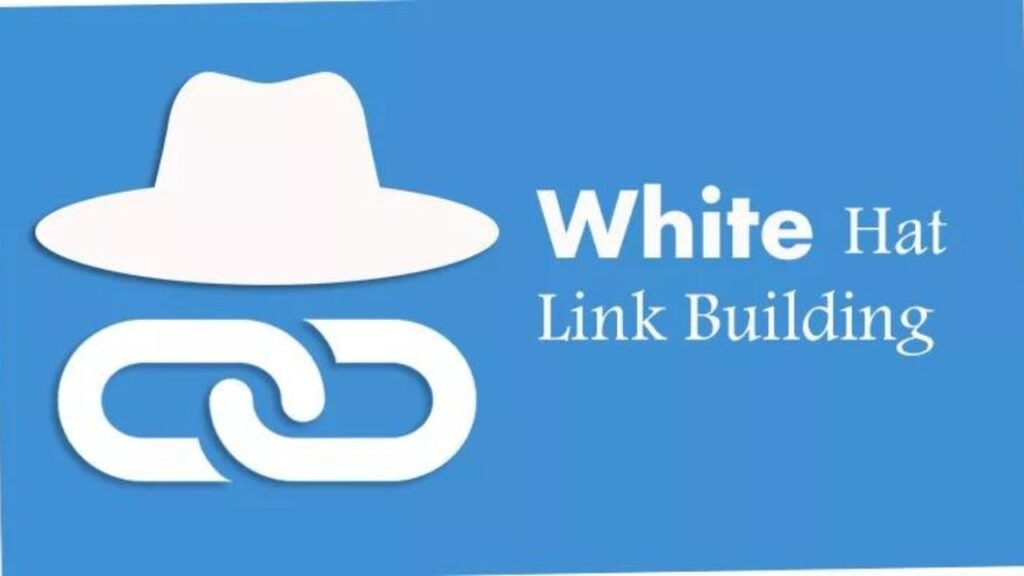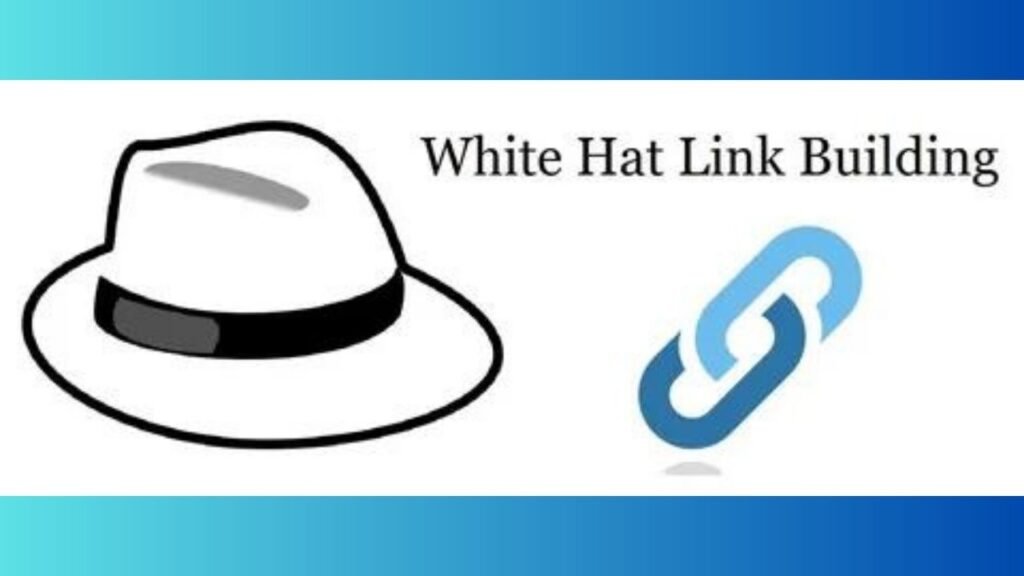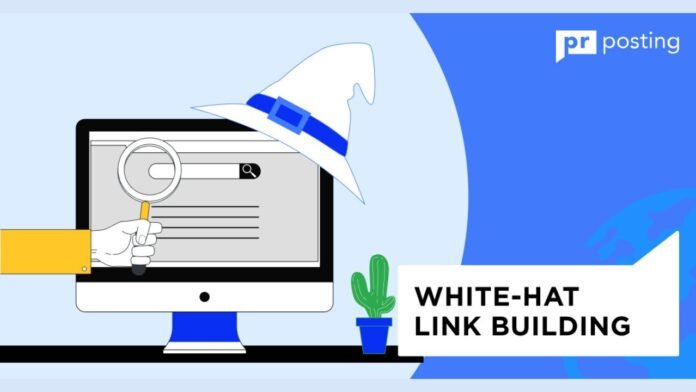To find white hat link building opportunities:
- Focus on reputable, authoritative sites within your niche.
- Use strategies like guest posting, networking, influencer outreach, and broken link building.
- Prioritize quality, personalize outreach, and track success through referral traffic and search engine rankings.
White Hat Link Building
White hat link building focuses on acquiring high-quality backlinks through ethical and sustainable methods. This approach prioritizes creating valuable content and fostering genuine relationships within your industry.
Effective strategies include guest posting on reputable sites, collaborating with influencers, and utilizing resource pages.
By avoiding manipulative tactics and prioritizing quality over quantity, you can enhance your website’s visibility and credibility while building a strong online presence.
Tracking referral traffic and monitoring search engine rankings help measure the success of your link-building efforts.
White hat link building ensures long-term success and aligns with search engine algorithms, fostering a solid reputation for your website.
Differences from Black Hat and Gray Hat Link Building
White hat link building uses ethical methods like quality content and genuine relationships to earn backlinks.
Black hat link building involves manipulative tactics such as link schemes or purchasing links, risking penalties from search engines. Gray hat link building falls between the two, using techniques that are not explicitly prohibited but may still carry risks.
Why White Hat Link Building Matters
Search engines, such as Google, regularly update their algorithms to prioritize high-quality, relevant content.
White hat link building aligns with these updates, ensuring that your website remains in good standing with search engines. By building links ethically, you can establish a strong online presence that will stand the test of time.
Moreover, ethical link building practices can lead to sustainable, long-term benefits for your website, including improved search engine rankings, increased organic traffic, and higher referral traffic.
Long-Term Benefits of Ethical Practices
Ethical practices offer long-term benefits such as sustainable growth and a strong reputation. By focusing on quality, transparency, and respect for user privacy, businesses build trust and loyalty. Ethical practices reduce legal risks and ensure compliance with regulations, leading to lasting success and positive brand perception.
Identifying High-Quality Link Sources
Identifying high-quality link sources is essential for successful link building. Look for reputable websites with high domain authority, trustworthiness, and relevance to your niche.
Analyze the quality of their content and audience engagement. Check for consistency in their publishing frequency and topics covered. Assess potential link sources for their link profiles and existing relationships.
Prioritize sites that offer genuine value and align with your brand. Collaborate with influencers, industry leaders, and authoritative websites to build credible connections.
By focusing on high-quality link sources, you can enhance your online presence and strengthen your website’s authority.
Reputable Websites and Domains
Reputable websites and domains are essential for successful link building and SEO. They are known for high-quality, valuable content and have strong domain authority. To identify reputable sites, look for those with a trusted reputation in your niche and engaged audiences. Collaborating with such sites can boost your online presence and credibility.
Strategies for Finding White Hat Link-Building Opportunities

There are several strategies you can employ to find white hat link building opportunities:
- Guest posting on authoritative sites: Contributing high-quality, original content to reputable blogs and websites can earn you valuable backlinks. Ensure that your content is relevant to the target site’s audience and provides real value.
- Networking and relationship-building: Building genuine relationships with other industry professionals can open doors to link building opportunities. Attend events, engage on social media, and participate in online forums to connect with like-minded individuals.
- Resource pages and content curation: Many websites have resource pages that list useful content for their audience. You may be included on these pages by creating high-quality content that addresses a specific need.
- Influencer outreach and collaborations: Partnering with influencers in your niche can lead to collaborative content opportunities and valuable backlinks. Build relationships with influencers through social media and other channels.
- Broken link building: This strategy involves finding broken links on high-authority websites and suggesting your content as a replacement. Offer a relevant, high-quality link that serves the website’s audience.
Analyzing Potential Link Opportunities
When analyzing potential link opportunities, assess the domain authority and relevance of the target site to your niche. Review the site’s link profile, looking for quality content and reputable backlinks.
Check for active engagement and an audience that aligns with your own. Evaluate the website’s overall quality, including its design and user experience, to ensure it meets your standards.
Avoid sites with low credibility, spam my links, or poor content quality. Prioritize opportunities that enhance your brand’s reputation and offer mutual benefits.
By carefully vetting potential link sources, you can establish high-quality partnerships that contribute to your website’s SEO success.
Reviewing Link Profiles and Quality of Content
Reviewing link profiles and content quality involves assessing the relevance and authority of linked sites. Examine the site’s domain authority, backlink diversity, and anchor text usage. Analyze the quality of the content linked to ensure it aligns with your brand values and audience interests. Prioritize links from reputable, high-quality sources.
Approaching Link Building with Integrity
Approaching link-building with integrity means focusing on ethical practices that prioritize quality over quantity—Personalize outreach by tailoring messages to each recipient, explaining how your content adds value to their site.
Build genuine relationships through clear, respectful communication and avoid manipulative tactics like link schemes. Offer high-quality content that is relevant and beneficial to your target audience.
Keep your approach transparent and honest, fostering trust with potential partners. Monitor your efforts’ impact on search engine rankings and referral traffic to ensure long-term, sustainable success. By building links with integrity, you create a strong, reputable online presence.
Personalization in Outreach Emails
Personalization in outreach emails can significantly improve response rates and build meaningful relationships. Tailor each message to the recipient’s interests and background, referencing specific content or projects.
Use their name and keep the tone conversational. By demonstrating genuine interest, you’ll stand out and increase the chances of establishing valuable connections.
Measuring the Success of Link-Building Efforts
Measuring the success of link-building efforts is crucial for understanding the impact of your strategies. Track referral traffic from acquired links to see how they contribute to your website’s performance.
Monitor changes in search engine rankings to assess improvements in visibility and authority. Use analytics tools to measure conversions, such as sales or leads, from traffic sources.
Additionally, keep an eye on the quality and relevance of links to ensure they align with your goals. By regularly evaluating these metrics, you can refine your link-building approach for better long-term results.
Monitoring Changes in Search Engine Rankings
Monitoring changes in search engine rankings helps you understand how your website is performing and where improvements can be made. Use tools like Google Analytics and Ahrefs to track rankings, keyword performance, and competitor analysis. Regular monitoring allows you to adjust your SEO strategy and optimize your site for better visibility and engagement.
White Hat Link Building Tools
Various tools can help you identify link-building opportunities and manage your outreach efforts:
- Link-building tools: Tools like Ah refs, Moz, and Majestic can help you find potential link opportunities and analyze your competitors’ link profiles.
- Outreach and relationship management tools: Tools like Buzz Stream and Pitch box can streamline your outreach process, making it easier to manage relationships with potential link sources.
Tools for Outreach and Relationship Management
Outreach and relationship management tools streamline the process of connecting with potential link sources.
Tools like Buzz Stream and Pitch box help you personalize and automate outreach emails, manage contacts, and track conversations.
These tools make building and nurturing relationships with industry influencers and partners more efficient and effective.
Common Pitfalls to Avoid
When engaging in white hat link building, avoid these common pitfalls:
- Over-reliance on link schemes: Focus on building genuine, high-quality links rather than pursuing quick fixes or manipulative tactics.
- Ignoring quality for quantity: Prioritize acquiring links from reputable sources over trying to amass a large number of low-quality links.
Over-Reliance on Link Schemes
Over-reliance on link schemes can harm your website’s reputation and SEO performance. Manipulative tactics, such as buying links or using link farms, may offer short-term gains but risk penalties from search engines.
Instead, focus on ethical, sustainable link-building strategies that prioritize quality, relevance, and long-term success.
Case Studies and Examples
Case studies of successful white hat link building demonstrate how ethical SEO practices lead to long-term success. For example, a software company increased its organic traffic by 30% by collaborating with influencers and earning backlinks from industry blogs.
A fashion brand boosted its search engine rankings by contributing guest posts to high-authority websites. These examples show the importance of creating valuable, relevant content and building genuine relationships.
By focusing on quality over quantity and adhering to ethical practices, businesses can achieve sustainable growth and avoid search engine penalties. Analyzing these case studies provides insights into effective strategies and approaches for white hat link building.
Real-World Examples of Successful White Hat Link Building

How to Find White Hat Link Building Opportunities, Successful white hat link building examples include:
- Guest posting on authoritative blogs.
- We are collaborating with influencers for content.
- We are utilizing broken link building to replace dead links on high-authority sites.
Other methods include earning links through compelling infographics and in-depth guides and being featured on resource pages.
Using Advanced Search Operators
Advanced search operators are specialized commands that help refine online searches. By using these operators, you can quickly find specific information on search engines. For instance, use quotes (“”) around phrases to search for exact matches.
Use site:domain.com to search within a specific website. You can exclude terms using a minus (-) before the unwanted word.
Additionally, search operators like in title: and inurl: help find pages with specific words in titles or URLs. These techniques save time and yield precise results for research, content discovery, or monitoring competitors. Experiment with different combinations to optimize your search experience.
Guest Post Opportunities
How to Find White Hat Link Building Opportunities, Guest posting is a popular white hat link building strategy. It involves writing articles for high-quality blogs and websites in your niche, including a link back to your site. Here’s how to find guest post opportunities in your niche:
Use keywords like “guest blog,” “guest blogging,“ and “write for us.“ You can also search using your competitor’s name to discover their guest posts and replicate their successful link-building strategies.
Conclusion
White hat link building is a powerful strategy for enhancing your website’s online presence and reputation. By focusing on ethical practices and prioritizing quality, you can establish a sustainable link-building strategy that will benefit your website for years to come.
FAQ
How to get White Hat Backlinks?
A straightforward method to gain white hat backlinks is by crafting content that naturally attracts people. By focusing on high-quality, engaging material, you can develop a successful white hat link-building approach that enhances your SEO efforts and generates referral traffic over the long term.
What is a Valid White Hat SEO Strategy?
A white hat strategy includes using well-labeled images with thoughtful alt text. The black hat uses more dated SEO practices, like keyword stuffing and invisible text. White hat SEO uses keyword research organically on a page.
Which SEO Tool is Best for Finding Backlinks to a Website?
Buzz Sumo is a widely used tool for backlink analysis. It allows you to track backlinks for your website and your competitors. The tool helps you monitor keywords, domain names, top-ranking pages, and the sources linking to them.
What is White Hat SEO Link Building?
White hat link building involves acquiring backlinks through strategies that fully comply with Google’s guidelines. This method is the safest approach to link building and minimizes the risk of Google penalties that could impact your search engine rankings. However, white hat strategies may progress more slowly compared to other link-building methods.
What is the Difference Between Link Building and Backlinks?
Link building involves acquiring links from external websites that direct traffic to your own site. There are two main types of links: backlinks and internal links. Backlinks, also called external or outgoing links, point to your website from other sites. Internal links, also known as inbound links, come from your website and lead to other pages within your site.


